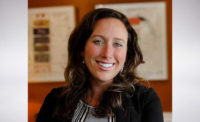Name/Title/Company: Hannah Stubson, sales engineer, ACI Mechanical & HVAC Sales
Age: 24
Educational Experience: Bachelor’s degree in mechanical engineering, Gonzaga University
Organizational Affiliations/Achievements/Awards: Member of ASHRAE and the Pro Shop
What does your day-to-day job entail?
My workday is different each day I walk into the office or visit a customer. I focus on a broad range of HVAC products on our line card. Daily, I assist engineers and mechanical contractors with design and selection of products. I also educate contractors and engineers on our various products and how they tie into different systems. My day could be spent answering emails and phone calls, or I may spend the day visiting job sites.
What caused you to/when did you fall in love with engineering?
The moment I realized I was going down the right path was during my senior year of college. My senior design project was with two of my good friends, who were chosen at random. Putting the last three years of education to the test while getting to be creative was very rewarding, even if the project “sort of” worked. Learning to collaborate and hold each other accountable has carried into my career in a positive way.
What has been the most rewarding/proudest aspect of your engineering career?
When I reflect back on the first two years of my career, I’m most proud of the progress I’ve made on the technical side of HVAC. Both of my parents are in the STEM field, and hearing them talk about their day-to-day jobs was always impressive to me. I always wondered how they could know so much and if I would ever get to that point. I’m not there yet, but the progress I’ve made in such a short time is encouraging. The rewarding part of my job has been gaining the trust of my customers, building a strong relationship with them, and helping them out of difficult situations when they arise. My customers’ trust and confidence in me lets me know I’ve done a good job.
What challenges do women face in this profession? Can you give a personal example? Why aren’t there more women in engineering? How can we increase the number of women in engineering?
Networking is a vital part for women in the engineering profession. I find networking barriers are my biggest headache at this point in my career. Not being included in informal events often limits my access to valuable opportunities. Twenty-four-year-old women don’t have too much in common with men who have four kids.
A lot of the networking in this profession happens on the golf course. It can be intimidating to put yourself in a game with primarily men. This summer, I played in a golf tournament where I noted one other woman golfing in a tournament of 64.
One great organization that I have gotten involved with in the past year and a half is called the Pro Shop. Its mission is to empower women in the industry through the game of golf. This nonprofit is a great step to give women the opportunities they otherwise wouldn’t have if they didn’t step on the golf course.
How many years have you been active in the engineering sector? What’s changed the most in that time? What’s changed the least?
I graduated from Gonzaga University in 2021, so I’ve only been in the working engineering sector for a little more than two years, so I don’t have much to note yet on what has changed. I started my internship with ACI shortly after the pandemic hit in 2020. Coworkers who have been in the field longer than I’ve been alive have made comments like, “just wait until things go back to normal.” I’d respond with, “Supply chain issues, rising material costs, and extended/ changing lead times are my normal.”
You are an avid golfer. What parallels can you draw between the game of golf and the engineering profession?
Some parallels that come to mind are patience, resilience, and continuous improvement. Golfers and engineers need patience and resilience to succeed. Golfers will face a tough round, but there’s always a next one so they need to stay focused and push through. Engineers encounter unexpected setbacks/failures but must be persistent to find a solution. Like my career, I can see my golf game improving. Putting in the time and effort to both golf and engineering results in continuous improvement.
You graduated from Gonzaga in 2021. Looking back, what do you remember most about your educational journey?
Looking back on my college experience, I think of all the wonderful friends I met and the late nights studying for our exams. A big drive for me to attend Gonzaga for mechanical engineering was the opportunity to study abroad while still graduating in four years. Many of my close friends and I went to Florence, Italy, for the 2019 spring semester. Some classes were world spirituality, ethics, dynamics, and ordinary differential equations. I feel extremely grateful I was able to have that college experience.
What drives/motivates you every day?
The HVAC industry has one of the highest potentials in reducing the world’s carbon footprint. More efficient systems and products reduce energy usage and result in positive change. I’m motivated to get to work each day to work with the people I’ve met (and have yet to meet) while collaborating with others to bring about this positive change to sustainable buildings and clean air.
What remains on your engineering bucket list — what do you aspire to do that you haven’t accomplished yet?
Short term, I have a goal to land a dust collection job — I have some in the works but it’s slow moving. Persistence is key, right? Also, in the next year I plan to take the Fundamentals of Engineering (FE) exam and pass. It’s one step at a time for me.
What’s one thing no one knows about you?
I’m passionate about energy code politics. I’ve talked with some mechanical contractors that work with state legislatures on drafting energy code policy. I would like to get more involved or at least learn more about it.
List any mentors who’ve helped you succeed and describe precisely how they’ve shaped your success.
My mom has been instrumental in my success since day one. She has 30-plus years in a male-dominant field with a degree in computer science. Her encouragement and guidance have elevated my resilience. The next person I’d like to highlight is my boss, Keith Glasch. He’s been supportive of my growth and encourages me to take on projects and make them my own. I feel grateful each day for the opportunities he extends and his guidance in the HVAC industry.
What advice do you have for prospective female engineers considering entering the field?
When I first entered the field, I was only focused on the technical side of my job. Those whom I saw as successful in my field talked a lot about soft skills. My advice is to build up your soft skills — it’s not something that’s often talked about in an academic setting.





